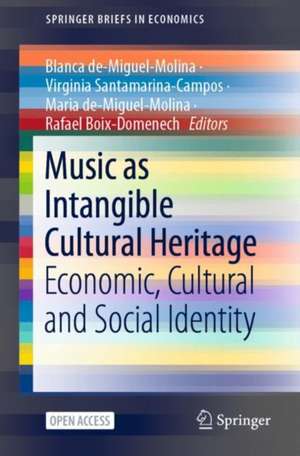Music as Intangible Cultural Heritage: Economic, Cultural and Social Identity: SpringerBriefs in Economics
Editat de Blanca de-Miguel-Molina, Virginia Santamarina-Campos, María de-Miguel-Molina, Rafael Boix-Doménechen Limba Engleză Paperback – 21 aug 2021
Topics include the economic value and impact of music, strategies for social innovation in the music sector, music management, and public policies to promote cultural and creative industries.
Din seria SpringerBriefs in Economics
-
 Preț: 444.35 lei
Preț: 444.35 lei -
 Preț: 264.79 lei
Preț: 264.79 lei - 15%
 Preț: 462.51 lei
Preț: 462.51 lei -
 Preț: 47.33 lei
Preț: 47.33 lei -
 Preț: 353.14 lei
Preț: 353.14 lei -
 Preț: 273.32 lei
Preț: 273.32 lei -
 Preț: 376.04 lei
Preț: 376.04 lei -
 Preț: 379.09 lei
Preț: 379.09 lei -
 Preț: 380.07 lei
Preț: 380.07 lei -
 Preț: 377.35 lei
Preț: 377.35 lei -
 Preț: 379.09 lei
Preț: 379.09 lei -
 Preț: 376.59 lei
Preț: 376.59 lei -
 Preț: 408.27 lei
Preț: 408.27 lei -
 Preț: 379.09 lei
Preț: 379.09 lei -
 Preț: 383.27 lei
Preț: 383.27 lei -
 Preț: 378.54 lei
Preț: 378.54 lei -
 Preț: 377.95 lei
Preț: 377.95 lei -
 Preț: 340.23 lei
Preț: 340.23 lei -
 Preț: 380.25 lei
Preț: 380.25 lei -
 Preț: 378.12 lei
Preț: 378.12 lei -
 Preț: 376.04 lei
Preț: 376.04 lei -
 Preț: 376.04 lei
Preț: 376.04 lei -
 Preț: 379.68 lei
Preț: 379.68 lei -
 Preț: 381.00 lei
Preț: 381.00 lei -
 Preț: 375.23 lei
Preț: 375.23 lei -
 Preț: 376.80 lei
Preț: 376.80 lei -
 Preț: 378.54 lei
Preț: 378.54 lei -
 Preț: 377.57 lei
Preț: 377.57 lei -
 Preț: 376.04 lei
Preț: 376.04 lei -
 Preț: 378.92 lei
Preț: 378.92 lei -
 Preț: 375.62 lei
Preț: 375.62 lei -
 Preț: 379.09 lei
Preț: 379.09 lei -
 Preț: 353.67 lei
Preț: 353.67 lei -
 Preț: 342.14 lei
Preț: 342.14 lei -
 Preț: 375.45 lei
Preț: 375.45 lei -
 Preț: 379.09 lei
Preț: 379.09 lei -
 Preț: 377.35 lei
Preț: 377.35 lei -
 Preț: 344.86 lei
Preț: 344.86 lei -
 Preț: 377.35 lei
Preț: 377.35 lei -
 Preț: 345.89 lei
Preț: 345.89 lei -
 Preț: 377.57 lei
Preț: 377.57 lei -
 Preț: 343.83 lei
Preț: 343.83 lei -
 Preț: 378.12 lei
Preț: 378.12 lei -
 Preț: 345.06 lei
Preț: 345.06 lei -
 Preț: 379.48 lei
Preț: 379.48 lei -
 Preț: 379.48 lei
Preț: 379.48 lei -
 Preț: 380.07 lei
Preț: 380.07 lei -
 Preț: 375.45 lei
Preț: 375.45 lei -
 Preț: 445.33 lei
Preț: 445.33 lei -
 Preț: 378.54 lei
Preț: 378.54 lei
Preț: 262.29 lei
Nou
Puncte Express: 393
Preț estimativ în valută:
50.20€ • 51.85$ • 41.78£
50.20€ • 51.85$ • 41.78£
Carte tipărită la comandă
Livrare economică 26 martie-09 aprilie
Preluare comenzi: 021 569.72.76
Specificații
ISBN-13: 9783030768812
ISBN-10: 3030768813
Pagini: 144
Ilustrații: XV, 144 p. 40 illus., 32 illus. in color.
Dimensiuni: 155 x 235 mm
Greutate: 0.24 kg
Ediția:1st ed. 2021
Editura: Springer International Publishing
Colecția Springer
Seria SpringerBriefs in Economics
Locul publicării:Cham, Switzerland
ISBN-10: 3030768813
Pagini: 144
Ilustrații: XV, 144 p. 40 illus., 32 illus. in color.
Dimensiuni: 155 x 235 mm
Greutate: 0.24 kg
Ediția:1st ed. 2021
Editura: Springer International Publishing
Colecția Springer
Seria SpringerBriefs in Economics
Locul publicării:Cham, Switzerland
Cuprins
Notă biografică
Blanca de Miguel Molina is Associate Professor at Universitat Politècnica de València (Spain). She has published in several international journals about innovation in creative industries. She is Specialist in industry analysis and business models.
Virginia Santamarina Campos is Full Professor at Universitat Politècnica de València (Spain). She is Coordinator of the research microcluster cultural and creative industries, tourism & tech and Expert of the Research Executive Agency of the European Commission. She is Specialist in responsible research and innovation in the creative sectors, concretely in cultural and intangible heritage.
María de Miguel Molina is Associate Professor at Universitat Politècnica de València (Spain). She has been Visiting Scholar at the University of Roehampton (UK) and UC Berkeley (USA), among others. She is Specialist in public policies and management and qualitative research methodologies.
Rafael Boix Doménech is Associate Professor of Applied Economics at the Department of Economic Structure at the Universitat de València (Spain). His research focuses on cultural and creative industries, industrial districts, and clusters.
Virginia Santamarina Campos is Full Professor at Universitat Politècnica de València (Spain). She is Coordinator of the research microcluster cultural and creative industries, tourism & tech and Expert of the Research Executive Agency of the European Commission. She is Specialist in responsible research and innovation in the creative sectors, concretely in cultural and intangible heritage.
María de Miguel Molina is Associate Professor at Universitat Politècnica de València (Spain). She has been Visiting Scholar at the University of Roehampton (UK) and UC Berkeley (USA), among others. She is Specialist in public policies and management and qualitative research methodologies.
Rafael Boix Doménech is Associate Professor of Applied Economics at the Department of Economic Structure at the Universitat de València (Spain). His research focuses on cultural and creative industries, industrial districts, and clusters.
Textul de pe ultima copertă
Caracteristici
Analyzes the relationship between immaterial, material, and inherent cultural landscapes applied to music Shows the political and economic dimension of music as intangible heritage Presents policy measures to strengthen social innovation and entrepreneurship in music as a cultural and creative industry This book is open access, which means that you have free and unlimited access
